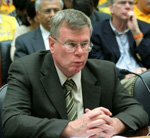 Albuquerque Journal: America’s move to arm the Syrian resistance, following our decisive military intervention in Libya, stands in stark contrast with our dithering over the fate of the only organized, secular, democratic opposition to the mullahs in Tehran.
Albuquerque Journal: America’s move to arm the Syrian resistance, following our decisive military intervention in Libya, stands in stark contrast with our dithering over the fate of the only organized, secular, democratic opposition to the mullahs in Tehran.
Albuquerque Journal
By: Col. Wesley Martin
 While the U.S. has announced it would provide military aid and financial assistance to yet another brave opposition movement in the so-called Arab Spring, Washington remains strangely irresolute concerning the plight of the Iranian opposition, who are the linchpin in confronting America’s greatest regional strategic challenge: the Iranian regime and its race toward nuclear weapons.
While the U.S. has announced it would provide military aid and financial assistance to yet another brave opposition movement in the so-called Arab Spring, Washington remains strangely irresolute concerning the plight of the Iranian opposition, who are the linchpin in confronting America’s greatest regional strategic challenge: the Iranian regime and its race toward nuclear weapons.
Indeed, America’s move to arm the Syrian resistance, following our decisive military intervention in Libya, stands in stark contrast with our dithering over the fate of the only organized, secular, democratic opposition to the mullahs in Tehran.
To date, America’s policy response to Iran’s threat has been to lead a multilateral campaign of economic sanctions. But Iran is punching holes in the boycott.
According to Reuters, Tehran is inking multimillion-dollar contracts to acquire surveillance systems from China to monitor land-line, mobile and Internet communications. The technology is then used to monitor and arrest young activists working peacefully for a democratic Iran.
There’s an even deeper, more troubling irony here.
While Tehran’s violations and suppression go practically unchecked, the U.S. Treasury Department has chosen to take “sanctions enforcement seriously” when it comes to the main Iranian opposition group, known as the Mujahedin-e Khalq. The MEK was unjustifiably put on the U.S. government’s list of “Foreign Terrorist Organizations” in 1997 as a naive “goodwill gesture” to Tehran.
A bipartisan group of 100 members of Congress, supported by former directors of the FBI and CIA, chairmen of the Joint Chiefs of Staff, top counter-terrorism experts, diplomats and elected officials have called for the MEK to be “delisted” as a terrorist organization.
As someone who lived with, worked with and protected MEK members in their besieged home in Camp Ashraf, Iraq, I have joined with these patriots in calling for the removal of this wholly unfair and counterproductive designation.
I testified twice before the U.S. Congress that when I was in charge of Camp Ashraf. I found members of the MEK to be among the best allies we had. They provided critical intelligence on Iran’s development of a nuclear weapons program and interference in Iraq.
They are unarmed and dedicated to democratic values shared by America.
This month, it was widely reported that the U.S. Treasury Department has launched an investigation targeting former senior U.S. officials who are critical of the terrorist designation of the MEK. The implication is that the Americans are defending a terrorist organization for money. This is outrageous.
Of note, like all the officers who directly served with the MEK and are now engaged in the campaign to delist them, I have never received speaking or writing payments. Treasury’s clumsy efforts to silence dedicated, patriotic Americans only hinder our ability to help our nation regain the moral and strategic high ground against Iran.
The U.S. government seems united in its resolve to surrender that high ground. In July 2010, the Court of Appeals for the District of Columbia ordered State Department to re-evaluate the MEK’s designation, ruling that the MEK’s due process rights had been violated and evidence against it was questionable. Previously, European and U.K. courts ruled that the MEK has no connection whatsoever to terrorism.
However, in violation of the court mandate, the State Department has refused to announce its position. Meanwhile the lives of 3,400 members of the MEK are in the balance, threatened by the pro-Tehran government in Iraq, which has already committed two deadly attacks against the dissidents, killing dozens under the pretext that they are “terrorists.”
It is unjustifiable that punitive measures against Iran’s main opposition group and their American allies are enforced more vigorously than those against Tehran. It is time for policymakers in Washington to abide by the rule of law and unleash the opposition, rather than acting as Tehran’s willing accomplice in their suppression and elimination.
Col. Wes Martin, an Albuquerque resident, was the first Antiterrorism/Force Protection Officer for all coalition forces in Iraq and later served as the first colonel to command Camp Ashraf in Iraq.


